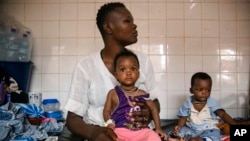When it comes to climate change, Africa is broadly considered the most vulnerable continent, warming faster than the rest of the world. “We are heading straight off a climate cliff,” said UN Secretary General Antonio Guterres. “Africa barely contributes to global greenhouse gas emissions. Yet, it is paying an outsized price.”
Indeed, “Africa is home to 17 of the world’s 20 most climate-vulnerable countries,” as the U.S. Ambassador to the United Nations Linda Thomas Greenfield said at the UN in October 2022.
“Climate change threatens the lives and livelihoods of millions of Africans. It exacerbates displacement and chronic underdevelopment in countries that already face economic, governance, and security vulnerabilities. And it is a key driver of food insecurity across the continent. Climate change means shorter growing seasons for farmers, which means smaller annual yields. This has reduced agricultural productivity growth by up to 40 percent in sub-Saharan Africa – 40 percent.”
“Climate change is a global challenge that requires urgent action,” said Ambassador Thomas Greenfield. “And, of course, it’s a challenge that requires all of us to advance sustainable, clean policies in our own countries.”
That’s because we know that the consequences of climate change are key drivers of conflict.
“When areas experiencing conflict or insecurity meet dwindling food supply and economic insecurity, the risk of violence goes up. And droughts, floods, fires, and severe weather are making food and economic crises even more dire and peacekeeping operations in complex environments even more dangerous.”
“These trends, along with rising political violence, conflict, and insecurity, leave families with impossible choices as they struggle to put food on the table,” said Ambassador Thomas Greenfield.
“That’s why the United States, through the Feed the Future initiative, has committed to investing more than 5 billion dollars over five years to strengthen global food security and nutrition. Sixteen of Feed the Future’s target countries are in Africa, and this initiative will help African communities and farmers better mitigate and adapt to scalable, sustainable, climate-smart agricultural methods. At the same time, we are working to help half a billion people in developing countries adapt to and manage the impacts of a changing climate through our PREPARE initiative.”
“Let us renew our commitment to work together … to unlock a resilient, sustainable clean energy economy,” said Ambassador Thomas Greenfield. “One that enables Africa, with its ample resources and dynamism, to mitigate the impact of the climate crisis.”






